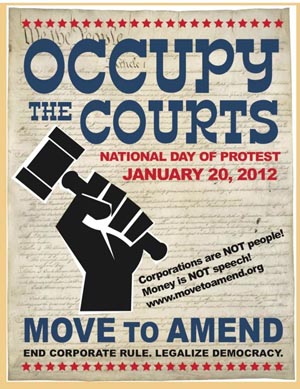
January 12, 2012
January 21st marks the second anniversary of the infamous January 21, 2010 Citizens United v. Federal Election Commission case, where the Supreme Court held that the First Amendment prohibits government from placing limits on independent spending for political purposes by corporations and unions. In other words, money equals speech. Move to Amend is planning occupations and rallies on January 20th to protest this Supreme Court decision.
What underlies the Citizens United decision is the assumption that corporations are natural persons within the meaning of Section 1 of the Fourteenth Amendment of the Constitution and therefore, have First Amendment rights. Corporate personhood dates back to the controversial 1886 Supreme Court decision in Santa Clara County v. Southern Pacific Railroad. Although the Supreme Court supposedly did not make a direct ruling on the question of “corporate personhood,” the misleading notes of a clerk finding corporate personhood were incorporated in the Court’s decision. Whether this is myth or reality doesn’t matter at this point. This result was a Supreme Court precedent finding that a corporation is a “natural person.”
Since then, the corporate personhood legal concept has been codified: “In determining the meaning of any Act of Congress, unless the context indicates otherwise– the words ‘person’ and ‘whoever’ include corporations, companies, associations, firms, partnerships, societies, and joint stock companies, as well as individuals.” (1 U.S.C. §1)
Not surprisingly, the influence of super political action committees (super PACs) was expected in the wake of Citizens United, presently in support of GOP primary candidates. Although super PACs cannot coordinate directly with campaigns, many of them are staffed by long-time supporters of the candidates. According to The Center for Public Integrity, through January 1, 2012, super PACs spent $12.9 million. The next reports for spending are not due until January 31st.
Consider that super PACs often spend more money in television and radio advertisements than the candidates themselves. For example, “Winning Our Future,” the pro-Newt Gingrich super PAC is expected to spend $3.4 million to launch an anti-Mitt Romney film before the South Carolina primary. While “Restore Our Future,” the pro-Romney super PAC is expected to spend $2.3 million before the South Carolina primary.
Clearly, there needs to be more disclosure about super PAC spending. However, the Disclosure Act, which would have increased transparency for super PACs and other groups spending money on campaigns, failed in a Republican filibuster in the Senate.
Some cities and states have defied Citizens United. In Montana, for example, the state Supreme Court upheld a longstanding law limiting corporate spending in politics. A lower court had held that Citizens United invalidated the state’s Corrupt Practices Act, a law passed by citizens’ ballot initiative in 1912, when it was common practice for the copper industry to bribe state politicians. On December 30th, the Montana Supreme Court allowed the law to stand in spite of Citizens United.
In another case, the 2nd U.S. Circuit Court of Appeals upheld a 2006 New York City law that, among other things, bans lobbyists from giving gifts to City officials and requires them to disclose all fundraising and consulting activities. Again, in spite of Citizens United, the court upheld the City’s right to put limits on political contributions and prevent “pay-to-play” schemes.
If the Montana or New York cases are appealed, the Supreme Court is likely to reverse these rulings, citing its precedent in Citizens United.
In other actions, on January 4, 2012, New York City passed a resolution opposing the Citizens United decision and supporting a Constitutional amendment abolishing corporate personhood, joining Los Angeles; Boulder; Albany; Oakland; Madison and Dane Counties, Wisconsin; and Missoula, Montana. The resolution declares support for an amendment declaring “that corporations are not entitled to the entirety of protections or ‘rights’ of natural persons, specifically so that the expenditure of corporate money to influence the electoral process is no longer a form of constitutionally protected speech.” On January 4th, a similar resolution was introduced in the California legislature. Hawaii passed a similar resolution last year.
It won’t be easy to stop big money from undermining our political process, but there is promising action at the state and local level to change the Citizens United decision either through a Constitutional amendment or through a new Supreme Court decision.


 The Hunger Site
The Hunger Site
January 22, 2012 at 6:06 pm
Nope, this is not just demonstrations. We really do plan to end corporate personhood. These actions are the beginning of a sustained education campaign aimed at informing human persons about the damage to their rights being done by corporate persons. One goal of the campaign is a constitutional amendment to overturn not just the Citizens United decision, but corporate personhood as a whole. This will likely require a nationwide movement to get 34 stage legislatures to call for a constitutional convention. Here’s Harvard Law Professor Larry Lessig explaining the issues at our Occupy the Courts rally on January 20th in New York City:
http://www.youtube.com/watch?v=oOOf4g23lSo&feature=related
January 12, 2012 at 3:57 pm
The body article appears to have nothing to do with the title. Occuply has no plans to end Corporate Personhood, either by lawsuit or initiating a Constitution Amendment. They are just planning more demonstrations.